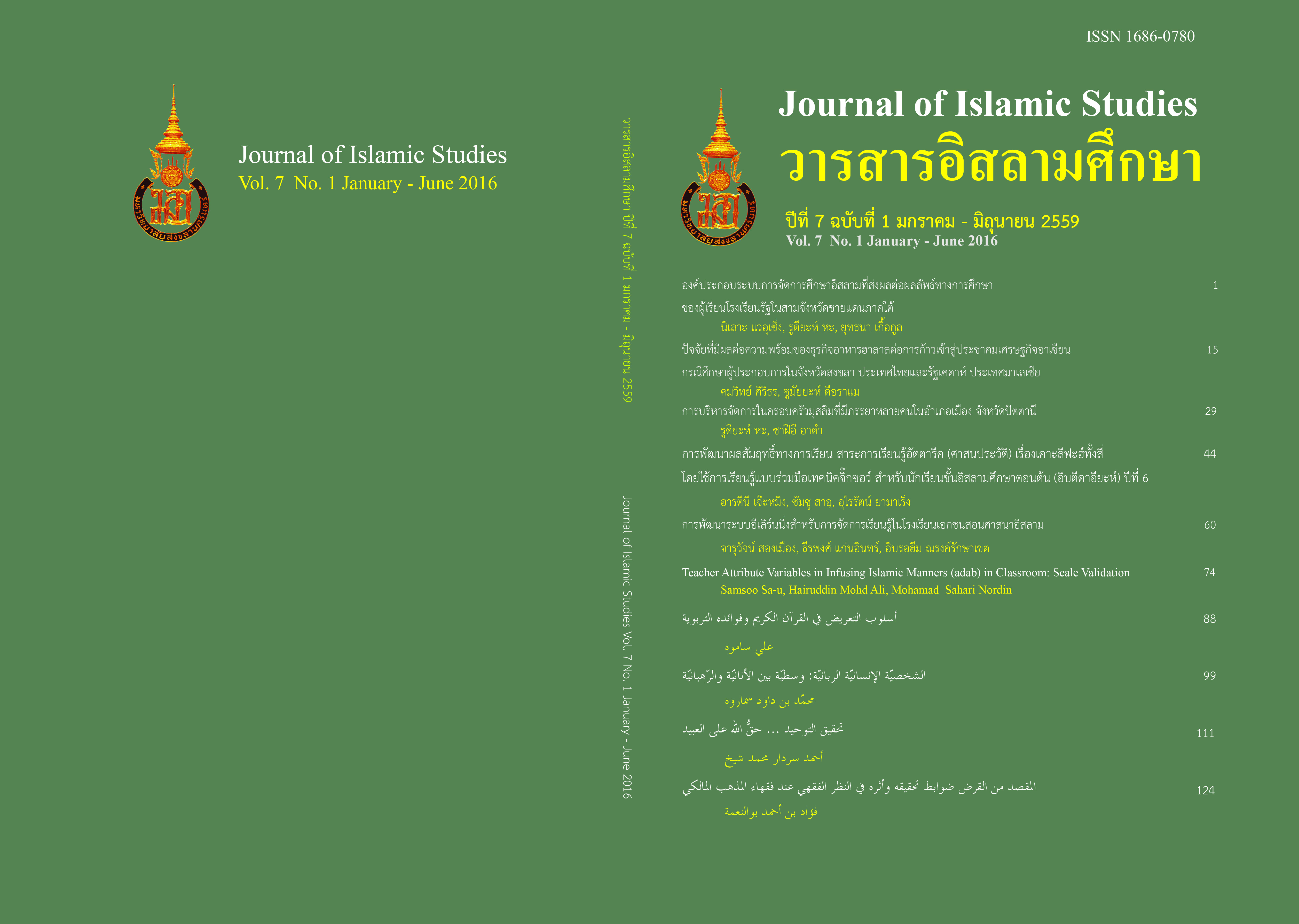Development of e-Learning System for Instruction in Islamic Private Schools
Keywords:
E-learning, Instruction, Islamic Private SchoolsAbstract
This Study is a research and development which aimed to develop E-learning system and its guidelines to apply the system in Islamic Private Schools. This research was divided into 4 periods such as, the period of studying the state and the need in teaching and learning; the period of system designing and development; the period of study’s effectiveness; and the period of experiment the system in the real situation. The results of the study showed as follows; E-learning system for the Islamic private schools was aimed at applying as learning media used along with teaching in classroom. E-learning consisted of 3 factors; 1) Support section, included policy and supporting, information technology foundation structure, and web-site management; 2) preparation process, included teachers, students, contents, activities and learning resources, assessment and evaluation, and 3) Instructional activities, included setting learning rules and students desired behaviors, presentation and sharing opinions, encouragement and learning response, applications, and result summarizing.
References
ซอลีฮะห์ หะยีสะมะแอ. (2551). มโนทัศน์การศึกษาในอิสลาม.โรงพิมพ์ชานเมือง : สงขลา.
สะการิยา แวโซะ. (2550). แนวโน้มการบริหารโรงเรียนเอกชนสอนศาสนาอิสลามในสามจังหวัดชายแดนภาคใต้ ระหว่าง พ.ศ. 2548-2558. เอกสารประกอบการประชุมวิชาการ การวิจัยทางการศึกษา ครั้งที่ 12. 15-16 พฤศจิกายน 2550. จัดโดย สํานักงานเลขานุการสภาการศึกษา กระทรวงศึกษาธิการ. สืบค้นเมื่อวันที่ 15 มีนาคม 2551 จาก http://edu.pbru.ac.th/pdf/ 20071106-sym-onec12.pdf
อิบราเฮ็ม ณรงค์รักษาเขต. (2551). ปรัชญาการศึกษาอิสลาม. หาดใหญ่กราฟฟิก: สงขลา.
จารุวัจน์ สองเมือง, เกษตรชัย และหีม, คอเหล็ด หะยีสะอิ, ฮาชิม อัชชารีฟ และมูหามัดรูยานี บากา. (2552). รายงานวิจัยระบบและกลการประกันคุณภาพภายในโรงเรียนเอกชนสอนศาสนาอิสลาม.
นิเลาะ แวอุเซ็ง, ผ่องศรี วาณิชย์ศุภวงศ์, อิบราเฮ็ม ณรงค์รักษาเขต, อะห์หมัด ยี่สุ่นทรง และมูหามัดรูยานี บากา. (2552). การจัดการศึกษาโรงเรียนเอกชนสอนศาสนาอิสลามในสามจังหวัดชายแดนภาคใต้. วารสารสงขลานครินทร์ ฉบับสังคมศาสตร์และมนุษยศาสตร์. ปีที่ 15 ฉบับที่ 5 (กันยายน-ตุลาคม 2552) หน้า 739-765.
EvgueniKhvilon and MarianaPatru. (2002). Information and communication Technologies in Teacher Education: A Planning Guide. (Ed. Paul Resta and Alexey Semenov). Unesco, Paris [Online]http://unesdoc.unesco. org/images/0012/ 001295/129533e.pdf (Accessed 15 June 2012).
Heather Kanuka. (2011). Through Philosophies-in-Practice. In Terry Anderson. Theories of Practice of Online Learning. Athabasca University. The Center for Distance Education. [Online] Available at http://www.aupress.ca/index.php/ books/120146 (Accessed: 07/10/2012).
Juan Quemada and Bernd Simon. (2003). A Use-Case Based Model for Learning Resources in Education Mediators. Educational Technology & Society, 6(4), 149-163. Available at http://ifets.ieee.org/periodical/6_4/14.pdf. (Accessed: 03/09/2012).
Mohamed Ally. (2011). Foundations of Educational Theory for Online Learning. In Terry Anderson. Theories of Practice of Online Learning. Athabasca University. The Center for Distance Education. [Online] Available at http://www.aupress. ca/index.php/books/120146 (Accessed: 07/10/2012).
Terry Anderson. (2011). Towards a Theory of Online Learning. In Terry Anderson. Theories of Practice of Online Learning. Athabasca University. The Center for Distance Education. [online] Available at http://www.aupress.ca/index.php/books/ 120146 (Accessed: 07/10/2012).
Tony Bates. (2001). National strategies for e-learning in post-secondary education and training. Fundamentals of Educational Planning- No.70. [online] http://unesdoc. unesco.org/images/ 0012/001262/126230e.pdf (Accessed 15 June 2012).
Downloads
Published
How to Cite
Issue
Section
License
Copyright (c) 2016 Journal of Islamic Studies, Prince of Songkla University, Pattani Campus, Thailand

This work is licensed under a Creative Commons Attribution 4.0 International License.
All articles Published in The Journal of Islamic Studies are author’s opinions, and not the responsibility of the Faculty of Islamic Sciences nor the editorial board. However any citation should be referred to the journal.
















